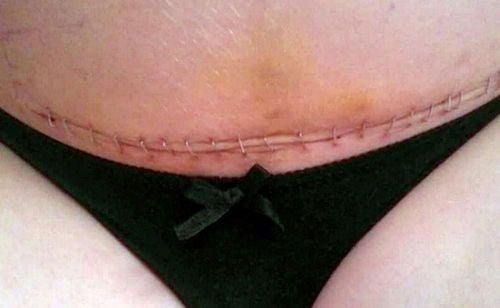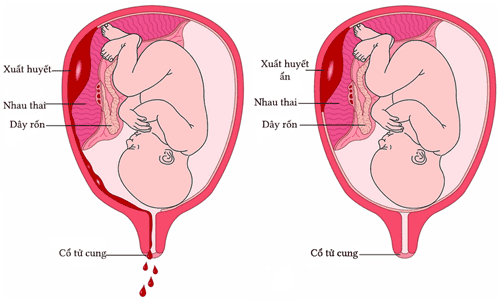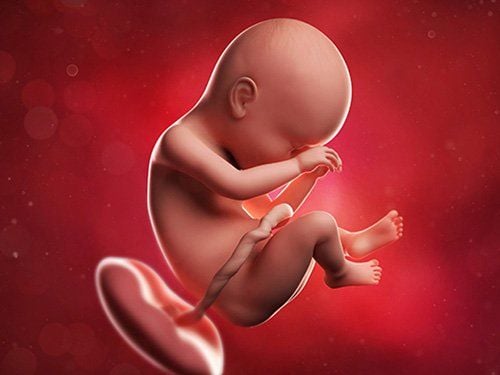This is an automatically translated article.
The article is professionally consulted by Master, Doctor Tran Lam Khoa - Department of Obstetrics and Gynecology - Vinmec Central Park International General Hospital.
A blood clotting disorder. Early diagnosis and timely treatment are necessary to save the mother and fetus's life.
1. What is a veggie?
Placental abruption is the premature shedding of the placenta when the fetus is not yet delivered and is a serious complication of pregnancy.
In the pathology of placental abruption, the placenta attaches itself to the correct position but is removed prematurely before the fetus is expelled due to the formation of a posterior hematoma. This hematoma grows larger and causes the placenta to detach from the uterine wall, cutting off the nourishment between the mother and the fetus.
Abortion is classified into grades I, II, III from mild to severe, in which level III is the most severe condition.
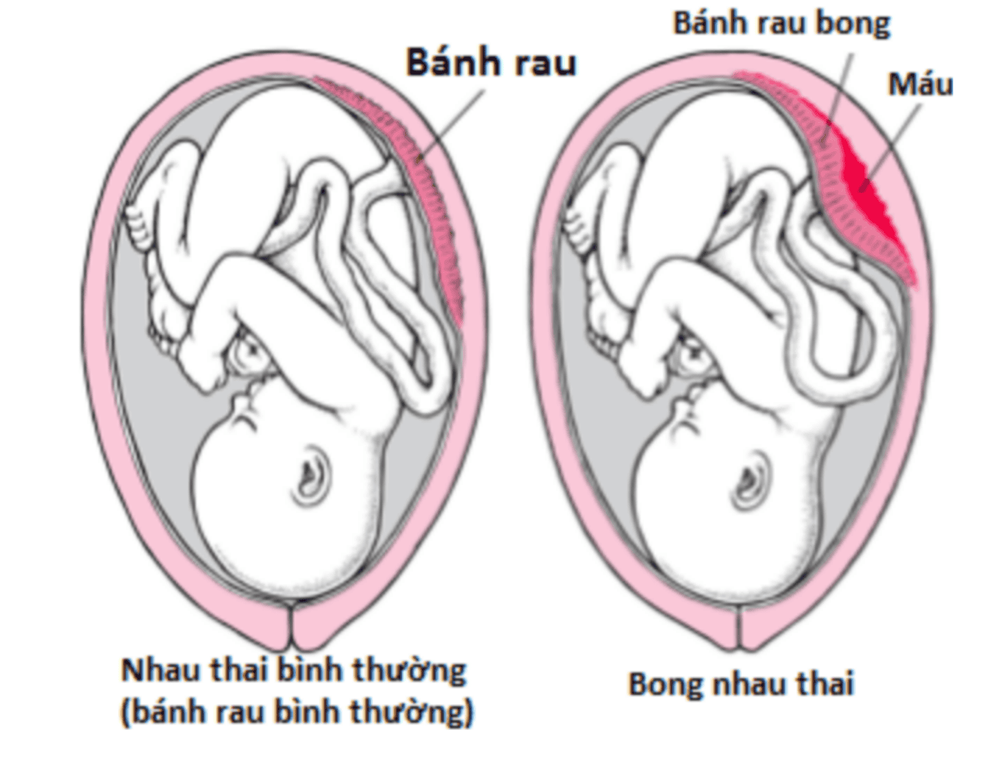
Hình ảnh bong nhau thai
2. The cause of vegetative growth
The main cause of placental abruption is unknown.
However, many studies show that traumas occurring during pregnancy can cause placental abruption, such as:
Direct trauma to the abdomen (due to traffic accidents, falling from a car, etc.) due to daily-life accidents, being hit or falling while working) Due to procedures performed on the fetus in the uterus (amniocentesis, umbilical cord blood collection, ectopic pregnancy,...) causing bleeding to form a mass Post-vegetable hematoma causes placental abruption. Preeclampsia. Sprouts are not heritable.
3. Risk factors for placental abruption
Age: placental abruption is more common in pregnant women over 35 years old or under 20 years old. History of placental abruption: if you have had placental abruption before, there is a risk of recurrence for the next pregnancy. Toxic gestational hypertension (hypertension with proteinuria) Substance abuse: placental abruption is likely to get worse if you smoke or use cocaine during pregnancy. Blood clotting disorders: Any condition that disrupts the ability of the blood to clot increases the risk of placental abruption. Multiple pregnancy: if you have multiples, the risk is higher than with a singleton. Pregnant women who do not have regular antenatal check-ups to detect the risk of pregnancy toxicity early, those with poor diets, hard labor, women living in remote areas, with difficult living conditions are at risk. The risk of placental abruption is higher than in urban areas.

Tình trạng nhau thai thường phổ biến ở phụ nữ trên 35 tuổi
4. Is there any danger of vegetative growth?
Once the placenta is separated from the uterine wall, there is no way to get the placenta back. If not treated promptly, the fetus will be deprived of oxygen and nutrients, and the pregnant woman will also experience severe blood loss. Placental abruption can lead to miscarriage, bleeding, premature birth and immediate emergency need. In severe cases, despite being managed, the life of mother and fetus is still threatened because of complications such as hemorrhagic shock, anuria, ...
Abortion progresses rapidly, if not handled promptly. It will lead to the following complications:
Hemorrhagic shock : shock occurs very quickly, disproportionate between the amount of blood loss seen in the vagina and the degree of shock. Coagulation disorders: abruption causes a significant loss of blood, loss of a large amount of clotting factors, so it affects the clotting process, causing blood to bleed after the placenta is removed. This complication is more severe if the progression of placental abruption lasts longer, so it is necessary to detect it early for immediate treatment. Anuria: the patient urinates very little, even no urine at all. Urine output should be monitored continuously during the first hours and subsequent days to detect this complication. Anuria is mainly due to shock causing hypotension, heavy bleeding, but also irreversible necrosis of the renal cortex, severe cases can lead to death. In addition, placental abruption can leave other very dangerous sequelae such as: acute liver and kidney failure, adrenal insufficiency, hypertension, ...
5. Prevention of abortifacients
In order to avoid the occurrence of placental abruption, which is dangerous for both mother and fetus, pregnant women should pay attention:
When pregnant, you must have a reasonable work and rest regime. You should register for regular antenatal check-ups at a reputable medical facility right after you become pregnant for advice and management during pregnancy. Folic acid supplementation before pregnancy. Treat conditions such as diabetes and hypertension early to reduce the risk of placental abruption. Placental abruption progresses rapidly and has many complications. Therefore, when detecting high-risk factors such as: vaginal bleeding, lower abdominal pain, continuous uterine contractions, ... pregnant women should promptly go to a hospital with an obstetrician-specialist for diagnosis and treatment. timely treatment.
The Department of Obstetrics and Gynecology at Vinmec is one of the spearheads that is synchronously and modernly equipped and has a team of doctors and nurses to ensure emergency obstetrics and gynecological emergency activities, as well as gynecological examination and treatment and care. obstetric.
6. Caesarean section due to obstetric pathology at Vinmec
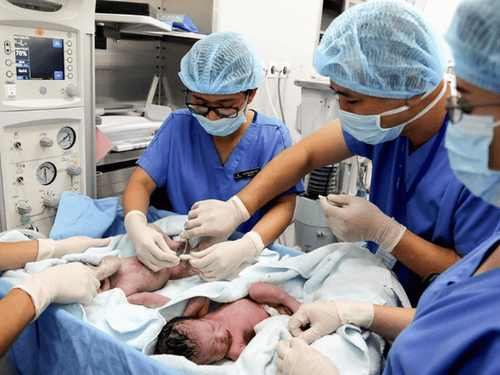
Sinh mổ tại Bệnh viện Đa khoa Quốc tế Vinmec
At Vinmec Hospital's Department of Obstetrics and Gynecology, many cesarean sections have been performed due to obstetric pathologies (placenta placenta, placenta previa, pre-eclampsia, eclampsia...), with a success rate of up to more than 90% and the rate of accidents and complications is lower than 10%.
Since its establishment and operation until now, the Department of Obstetrics and Gynecology has performed thousands of surgeries and procedures such as routine delivery, placenta previa, placenta previa, removal of uterine fibroids. , laparoscopic surgery to remove ovarian tumours, implantation of contraceptive rods... All surgeries and procedures are performed according to standards and with good professional quality.
In addition, the Obstetrics Department of Vinmec International General Hospital has been highly appreciated by customers for its professional quality as well as professional care services.
Comprehensive mother and baby care : Comprehensive mother & baby health care, from before - during - after pregnancy fully; prenatal and postnatal screening for infants and mothers; heel test; maternity package ; pre-marital examination; prenatal care and counseling; cord blood storage. Children receive the best care from birth: right after the baby is born, the baby is skin-to-skin with the mother, the umbilical cord is cut by the father, and is monitored and cared for in the special care room for a few days. 12 hours for early detection of transient respiratory failure or other medical conditions. The baby is fully vaccinated. The birth team not only has obstetricians and midwives, but also has pediatricians on duty, monitoring to handle problems arising for the baby during the birth process. Modern and advanced techniques: Painless delivery by special anesthetic techniques. Treatment and care for extremely preterm infants < 27 weeks - Vinmec is the only hospital in the North that can save the lives of babies born 24 weeks premature. Outstanding equipment: The room is designed according to international hotel standards, with modern equipment such as: specialized transport incubators with ventilators, blood suction, pressure controlled oxygen tubes; deafness screening machine, brain cooling machine to treat asphyxia; CFM brain function monitor; Monitor 5 parameters; Resuscitation bed with built-in heating lamp. To register for an examination with experienced obstetricians, customers please book an appointment directly at the website for service.
Please dial HOTLINE for more information or register for an appointment HERE. Download MyVinmec app to make appointments faster and to manage your bookings easily.




